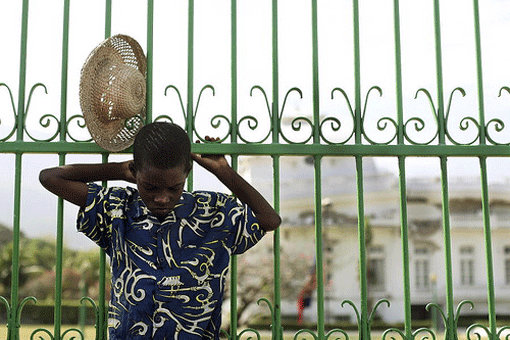Haitians in Haiti and throughout its Diaspora will gather on January 12 for a day of remembrance to honor the quarter-million people who lost their lives as a result of the earthquake three years ago. The tremendous international response to the earthquake brought a degree of hope amid the devastation. But on the three-year anniversary, Haitians are yet again mourning the loss of loved ones with increased anxiety about their future.
Just as older Haitians tend to delineate Haitian history as before and after President François Duvalier (1957–1971), younger Haitians are now using the January 12, 2010, earthquake (or douze Janvier) as their baseline for articulating Haitian progress. While the rubble and tents continue dissipating from view, the fact that many Haitians now colloquially break down Haiti’s timeline as avant (before) and après (after) douze Janvier, reiterates the indelible mark this event has left on Haiti—one that will be felt for decades.
Clearly the slow pace of rebuilding projects and undelivered donations are by-products of the earthquake. They are nevertheless also concurrent with the political instability and poor infrastructure that has plagued Haiti for the last half century.
Questionable leadership, high unemployment, shabby roads, and an inability to cultivate and support entrepreneurship all predate douze Janvier. Therefore the focus for post-earthquake Haiti should place less emphasis on what is being done for recovery. Instead, attention should be paid to the degree of progress made in ameliorating the problems that allowed for the earthquake to have such a devastating effect. Destruction is inevitable from a 7.3-magnitude earthquake, but the extreme devastation was a result of the poor state of pre-earthquake Haiti and the overpopulation of its capital city.
To its credit, at least at the level of the presidency, Haiti is slowly becoming more politically stable. In many ways President Michel Martelly’s background as a performer makes him uniquely poised to handle the various forms of political theater associated with being a head of state. For example, last year Martelly seemed to revel in the ongoing saga about whether he held a Haitian passport, repeatedly using it as an opportunity to chide members of Parliament before finally stepping forward and showing his Haitian passport.
Still, Martelly has shown far less dexterity in extricating himself from the Duvalier vs. Aristide conundrum—political polarization between supporters of former Presidents Jean-Claude Duvalier and Jean-Bertrand Aristide–that has undermined Haitian politics for almost 30 years. This continued polarization does little to inspire public support for the political process in Haiti, or in developing more competent legislators on the local level capable of ensuring that their constituents are receiving highly needed social services.
The result is a continued focus on Haiti’s preeminent bête noire: poor infrastructure. “The problem is that at the same time as Haiti needs investment to generate social stability and economic growth, it also needs social stability and better infrastructure to attract investment,” notes The Economist. It’s a classic chicken or the egg phenomenon. In addition, The Economist notes that from September 2011 to September 2012 the economy expanded by a modest 2.5 percent. It was the second year of dashed expectations: the IMF had forecast growth of 8 percent in both 2011 and 2012. The government is also hampered by its lack of suivi, or implementation capacity. Many public employees are time-servers who owe their jobs to past patronage; many in Mr. Martelly’s administration lack experience of government.
Given the global financial climate and Haiti’s attempt to rebound from a cataclysmic earthquake, it is not entirely surprising that it would fall short of IMF growth estimates. Still it has to be jarring that Haiti is barely able to eclipse one-quarter of its projected economic output.
More startling, however, is the fact direct budget support for Haiti’s government declined in 2011 and 2012. The progressive advocacy organization Common Dreams finds that direct budget support for Haiti’s government declined 28 percent between 2009 and 2011. Therefore, Martelly’s administration is not only being asked to do more with less money, but to do so with many public servants who are ill equipped to execute their jobs.
With each passing year it is harder for the earthquake and the surrounding events to retain their significance, particularly for Haitians living abroad. But one way to help ensure those who died on January 12, 2010, did not do so in vain—and to amplify the significance of Haiti’s need to develop more human capital in its public service sector— is to make January 12 a Day of Service in Haiti. While this may viewed as merely a symbolic gesture, the power of the sight of thousands of Haitians committing themselves to serving their country, even for just one day, cannot be understated. Moreover, adapting this pastime would serve as a vivid illustration that L’Union does indeed fait la force.






